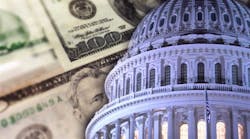Trucking industry officials were quick to praise final approval of tax reform legislation.
The bill passed the House 224-201 on Dec. 20, hours after the Senate backed it 51-48. The House initially approved the measure prior to the Senate, but was required to vote again due to procedural errors.
President Trump has indicated he will sign the legislation into law.
“With his signing of this bill into law, there will be more trucks on our roads, making the deliveries fueled by an expanding economy,” said Chris Spear, president and CEO of American Trucking Associations. “The ATA and its members are proud supporters of this bill and welcome the countless benefits it will bring to the United States economy.”
The legislation reduces the U.S. corporate tax rate to 21% from 35% for businesses and doubles the estate-tax exemption to $11.2 million per person.
The legislation will also allow faster write-offs for business investments, and creates new rules for taxing international profits. Taxes will also be reduced for pass-through businesses and sole proprietorships.
On Twitter, UPS Inc. called it “a pro-growth bill that will level the playing field for American businesses.”
Ahead of final passage, Arik Spencer, executive vice president of the North Dakota Motor Carriers Association, said “lowering the tax rates will free up small businesses to reinvest more of their hard earned revenue into their own growth, such as hiring new employees or purchasing new equipment.”
He also said “increasing the threshold for the estate tax will allow these family businesses to move forward unto future generations without gratuitously penalizing families for taking a risk, achieving success and delivering value to their customers and community.”
That was a similar message shared by Barry Pottle, president and CEO of Pottle’s Transportation, in an opinion piece published in the Bangor Daily News.
Thomas Donohue, president and CEO of the U.S. Chamber of Commerce, said the bill “grows the economy and improves the lives of America’s families, workers, and job creators.”
The bill contains a clause to end the penalty for individuals who do not have health insurance starting in 2019. It also opens part of the Arctic National Wildlife Refuge to oil drilling.



